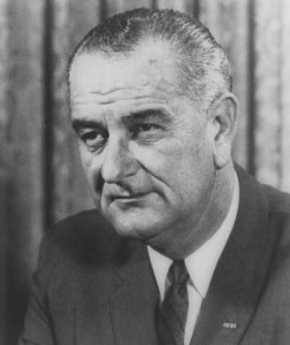Related Topics
Medical Economics
Some Philadelphia physicians are contributors to current national debates on the financing of medical care.
Insurance in Philadelphia
Early Philadelphia took a lead in insurance innovation. Some ideas, like life insurance, flourished. Others have faded.
Medical reform Subjects (1)
New topic 2019-05-24 20:49:32 description
"New" Health Care Reform, 1965

|
| Lyndon Johnson |
In 1965, Lyndon Johnson caused the enactment of two amendments to the Social Security Act, Titles 18 and 19. Title 18 is now called Medicare (for the elderly), and Title 19 is called Medicaid (for poor people). These two laws were cobbled together as negotiated compromises; the history of this contraption no longer concerns us. The outcome is that Congress created a Federal program for the elderly, and a state-administered program for the poor, partly financed by the states but mostly financed by federal taxes. The states howl that Medicaid is an unfunded mandate, and the Federal bureaucracy snarls that the states are mismanaging someone else's money. The welfare patients are bitter about second-class treatment, and doctors have as little to do with this system as possible. The focus of this article, however, is on the harmful effect of Medicaid on hospitals. Of all the stakeholders affected by Medicaid, the hospitals have historically been the best treated. Nevertheless, it has brought them to the brink of ruin, most of them acknowledge it, and matters are so hopelessly snarled that it is time to call for a transfer of the medical components of Medicaid to Medicare. In plain language, that means replacing state administration with federal Medicare management.
It may seem peculiar to call for extracting the medical components from a medical program. Forty years of creeping modifications in fifty different state directions have resulted in many state Medicaid programs spending more on nursing homes, home care, and various educational programs -- than on the activities of doctors and hospitals as originally intended. After forty years, this creeping mandate shows no sign of abating. It may never abate, but certain parts of it could rather easily be transferred to federal Medicare program, leaving the innovative fringes to fight their own battles with state legislatures, arguing those merits independently of this issue.
From the hospital point of view, Medicaid pays substantially (20-40%) less than the costs it claims to cover. The chiseling is worse in some states than others, but it is hard to find a single state Medicaid program which clearly pays its costs in full. Medicare is pretty tight-fisted, too, but at least a majority of knowledgeable insiders would admit it comes pretty close to paying its audited costs. Everybody else pays more than costs, but for this discussion that is irrelevant. Government as a whole is not paying its fair share, the state-administered portion is responsible, and there was never any non-political justification for having two programs. So, combine them. Other components of Medicaid, however worthy in intent or effect, are the responsibility of the various states which created them. When the states have got non-hospital, non-doctor issues carved out and audited, the merits of federal funding can be examined.
Two other features of the Medicaid mess can be mentioned, so long as they are not allowed to befuddle the main message of program consolidation. In general, the proportion of elderly or poor clients in rural hospitals does not materially differ from the proportion of such clients in urban hospitals. There is institutional variation, of course, but the principal distinguishing feature is that small rural hospital is necessarily semi-monopolies within fifty-mile districts, whereas urban hospitals face competition more directly. State governments, therefore, are unable to impose discounts on rural hospitals with the same leverage and severity. Seeing this, urban hospitals have often applied political pressure on the legislature to extend comparable relief to them. Since local labor and living costs are lower in rural areas, an excuse is created to word regulations and state laws in a way which recognizes parity in the ratio of audited costs to charges rather than the charges or costs themselves. Quite often, hospital accountants can outwit legislatures in these obscurities, leading to rather obscenely high list prices for hospital services, to shift the ratio. Although it has the temporary advantage of further obscuring public market prices for such services, it constitutes a serious injury to uninsured patients. Other persons, who might perceive no personal need for insurance, are driven to buy it in order to protect themselves from gouging.
Medicare itself is certainly not perfect. The largest remaining issue confounding hospital charges can be traced back to weaknesses of a 1983 Medicare law, the Budget Reconciliation Act. Reimbursement legislation traditionally overpays initially, with every intention of paring prices down later. The providers, hardened to this maneuver, try to stonewall all subsequent amendments as long as they can. In this case, the overpayments have persisted so long they have become basic assumptions, triggering internal re-adjustments which make resolution still more difficult. A number of hospitals have been severely fined for violating the spirit of this law, however close they may come to obey the letter of it. On the other hand, other courts have held that a situation which has been allowed to persist so long can be deemed to be settled law. The result is a predicament which is quite unnecessary, and might be rather readily corrected.
But let's not wander too far from the basic proposal. The corresponding (doctor and hospital) portions of Medicaid should be consolidated into Medicare, with remaining issues settled independently. Consolidating two government programs may not quite be the "single payer" concept that others had in mind, but it resolves most of the legitimate problems which provoked that mysterious slogan.
Originally published: Thursday, December 28, 2006; most-recently modified: Saturday, May 25, 2019